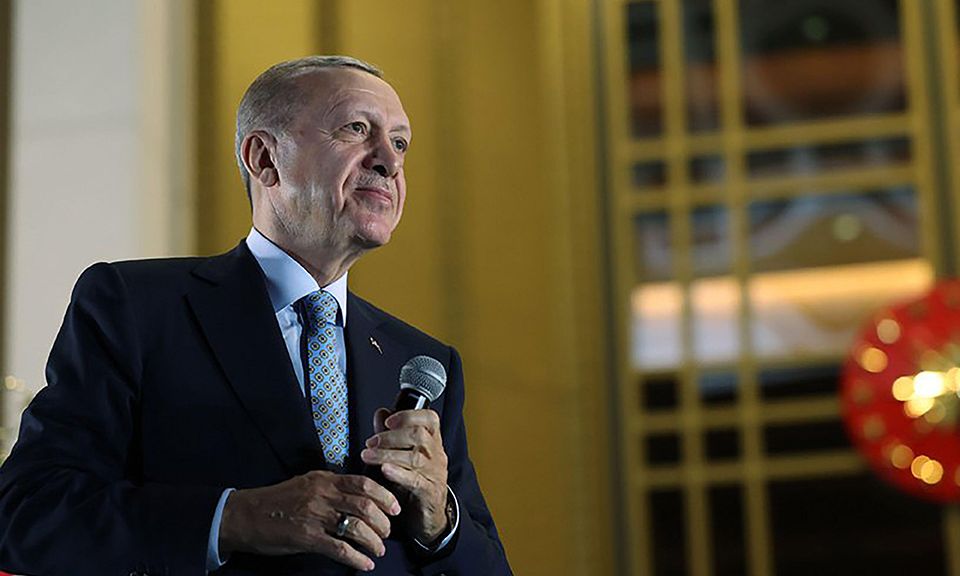President Recep Tayyip Erdoğan was re-elected on on Sunday 28 May Image: UPI/Alamy Live New
Turkey’s long-time leader Recep Tayyip Erdoğan handily won a runoff election on Sunday to extend his rule into a third decade after a divisive campaign electrified his conservative base but antagonised his detractors, who include many of the country’s artists.
Most voters shrugged off warnings from his challenger Kemal Kılıçdaroğlu that the election was a last chance to “shut the gates of hell” on Erdoğan’s authoritarian style of rule that has undermined democratic norms. Provisional results from the Sunday ballot show the incumbent won 52% of the vote to Kılıçdaroğlu’s 48%.
Turkey’s creative community fears Erdoğan could now intensify a long-running crackdown that has intimidated artists, musicians, filmmakers and other cultural activists. Kurdish, female and gay artists feel especially vulnerable after Erdoğan exploited social fissures to galvanise religious and nationalist voters, claiming opposition parties were “LGBT” and labelling the country’s main Kurdish bloc, with 5 millions voters, “terrorists.”
“I am anxious about the environment for making art. I am not at the point of applying self-censorship…but I worry about the community as I see people withdraw into their shells,” says Fatoş İrwen, whose charged sculptures incorporate organic material including her own hair to question the power of the state. İrwen, who is Kurdish, served a three-year prison term for attending a political protest before she was freed in 2020.
Osman Kavala, a philanthropist who supported marginalised artists in Turkey, and the filmmaker Ciğdem Mater, remain behind bars for participating in mass anti-government demonstrations a decade ago.
“Many artists feel alienated in a society that would re-elect Erdoğan despite these limits on free expression. They’re demoralised and thinking, ‘If this is what the country wants, what am I to do?’” says Kültigin Kağan Akbulut, an art critic and founding editor of the website Argonotlar.
Erdoğan has long lamented the power of art to inspire political action and has vowed to raise a new generation to wrest cultural influence from his opponents. In the past year alone, the government has cancelled more than a dozen music festivals and yanked state financing from projects that diverge from the official narrative, including Burning Days, which debuted at the Cannes Film Festival but was forced to return culture ministry funds after government-affiliated media called the film homosexual propaganda.
Turkey’s culture wars flared anew the night before the election when Merve Dizdar became the first Turkish woman to win best actress at Cannes for her role in About Dry Grasses directed by Nuri Bilge Ceylan. Dizdar dedicated her prize to “to the souls struggling for the better days that Turkey deserves”.
In response, Turkey’s deputy minister of culture Serdar Çam compared her to anti-Turkey “lobbies” in the West. “Slices of that pie that you do not deserve will be gradually distributed to new cadres that are being trained now,” he said in a tweet, referring to financial support.
Private companies have stepped into the funding breach for the country’s biggest culture institutions and events. But their reliance on amicable relations with the government to conduct business in the for-profit realm can encourage silence on the state’s interventions in culture, including Kavala’s imprisonment.
“Kavala remains in prison because he’s a symbol, a message to those with capital that if they get involved, open an art space, try to strengthen civil society, this is what will happen,” Akbulut says.
The Istanbul Museum of Modern Art invited Erdoğan to speak this month after it reopened in a Renzo Piano-designed building within a cruise-ship port and shopping complex on the Bopshorus Strait. In what sounded like a stump speech, Erdoğan railed against the short-shrift given to traditional Ottoman culture and said criticism of his cultural legacy, specifically a 1,000-room presidential palace he built on former forestland in the capital Ankara, were “lies and slander propaganda.”
Yet the opening of Istanbul Modern, whose mission includes making contemporary art accessible to all segments of society, in the current climate shows how vital art remains, says Kerimcan Güleryüz, an independent curator who runs the Empire Project gallery.
“The pressure cooker that Turkish artists are in creates better art. Turkish art is political precisely because it can be deemed a thought crime,” Güleryüz says. “The community has figured out what democracy is good for and that they have to fight for it.”
Working as a Kurdish artist in Turkey can make İrwen “feel like couch grass. That’s the tenacity we need now,” she says. “What gives me hope is this election becomes motivation for artists. For that to happen, it is vital that institutions do not abandon artists now, both morally and materially.”

